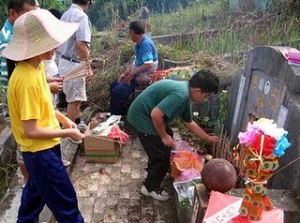 India and China both celebrated the first day of the fifth solar term, on the 5th of April. While India celebarated Gudi Padwa/ Yugadi/ Ugadi or Cheti Chand (depending on where you come from in India), to mark the beginning of the New year according to the lunisolar Hindu calendar, China celebrated Qīng míng jié marking a time for people to go outside and enjoy the greenery of springtime and tend to the graves of departed ones. Also the 15th day from the Spring Equinox, both the Indian and Chinese festivals celebrate the rich harvest at the end of the winter season and the beginning of the new summer season of sowing.
India and China both celebrated the first day of the fifth solar term, on the 5th of April. While India celebarated Gudi Padwa/ Yugadi/ Ugadi or Cheti Chand (depending on where you come from in India), to mark the beginning of the New year according to the lunisolar Hindu calendar, China celebrated Qīng míng jié marking a time for people to go outside and enjoy the greenery of springtime and tend to the graves of departed ones. Also the 15th day from the Spring Equinox, both the Indian and Chinese festivals celebrate the rich harvest at the end of the winter season and the beginning of the new summer season of sowing.
India, being a diverse nation with different regions celebrating the festival in their own ways, various terms are used for the same festival. While the people of Karnataka and Andhra Pradesh use the term Yugadi/Ugadi for this festival, the people of Maharashtra term the same festival, observed on the same day, Gudi Padwa. Sindhis, people from Sindh, celebrate the same day as their New Year day Cheti Chand. Manipuris also celebrate their New Year (Sajibu Cheiraoba) on the same day. It is observed as Baisakhi in Punjab and Puthandu in Tamil Nadu. Further, being an agrarian country, this day marks the end of one agricultural harvest and the beginning of a new one. In this context, the festival is celebrated at the end of the Rabi or winter crop season. Regardless of the term used to describe the festival, its celebrated with new clothes, traditional, regional speciality dishes and meeting and greeting with friends and family.
In China, the Qingming Festival is an opportunity for people to remember and honour their ancestors at grave sites. Young and old pray before the ancestors, sweep the tombs and offer favorite food, tea, wine, chopsticks and joss paper accessories to the ancestors. Many construct objects the deceased desired or loved such as cars, computers, houses and watches out of paper in honor of the departed soul. On Qīng míng jié people also go on family outings, start the spring plowing and fly kites in the shapes of animals or characters from Chinese opera. Celebrated across China, Taiwan and Hong Kong as well as several countries that have a significant Chinese population, the festival is celebrated with delicious regional favourite foods and merriment.
